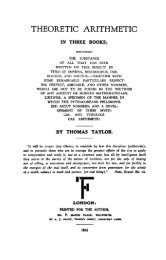Perl - The Good of the Intellect.pdf - Platonic Philosophy
Perl - The Good of the Intellect.pdf - Platonic Philosophy
Perl - The Good of the Intellect.pdf - Platonic Philosophy
You also want an ePaper? Increase the reach of your titles
YUMPU automatically turns print PDFs into web optimized ePapers that Google loves.
<strong>The</strong> <strong>Good</strong> <strong>of</strong> <strong>the</strong> <strong>Intellect</strong> 29<br />
Indeed, for Plotinus, not only is intellection a mode <strong>of</strong> intuition, it is <strong>the</strong> supreme<br />
and paradigmatic mode. As such, intellect represents not a self-enclosed subjectivity<br />
abstracted from all actually given content, but ra<strong>the</strong>r, on <strong>the</strong> contrary, <strong>the</strong> purest<br />
form <strong>of</strong> “openness,” <strong>of</strong> active receptivity. It is <strong>the</strong> very nature <strong>of</strong> intellect to have<br />
always already “received” all being, and indeed intellect is nothing but this havingreceived.<br />
Pierre Rousselot remarked long ago that intellect in Aquinas should be<br />
understood as <strong>the</strong> faculty not <strong>of</strong> abstraction but <strong>of</strong> “intussusception,” <strong>of</strong> taking up<br />
into oneself; 14 and this is no less true for Plotinus and for <strong>the</strong> entire classical tradition.<br />
<strong>Intellect</strong>, <strong>the</strong>refore, is not “poor” but, on <strong>the</strong> contrary, most rich in intuition,<br />
in immediacy, in givenness.<br />
This understanding <strong>of</strong> intellect as intuition has an extensive background in<br />
both Plato and Aristotle. Plato is <strong>of</strong>ten accused <strong>of</strong> setting western philosophy on<br />
<strong>the</strong> path toward abstract, objectifying rationalism. We are told that by adopting <strong>the</strong><br />
“ocular model” for knowledge and identifying being with eidos or idea, <strong>the</strong> “look”<br />
for <strong>the</strong> mind, Plato reduces thought to a “gaze” directed toward “objects” extrinsic<br />
to itself. But this is not, <strong>of</strong> course, what Plato means. Ra<strong>the</strong>r, in adopting <strong>the</strong> analogy<br />
<strong>of</strong> vision to describe intellectual knowledge, he is expressing precisely what in<br />
modern phenomenological language is called intuition, Anschauung. “Vision” here<br />
implies not extrinsic objectification, but on <strong>the</strong> contrary, <strong>the</strong> immediate toge<strong>the</strong>rness<br />
<strong>of</strong> <strong>the</strong> seeing and <strong>the</strong> seen. What I see is not outside me, but is immediately given<br />
as <strong>the</strong> very content <strong>of</strong> my awareness. Plato frequently articulates this toge<strong>the</strong>rness <strong>of</strong><br />
<strong>the</strong> knower with <strong>the</strong> known by describing intellection not only through <strong>the</strong> analogy<br />
<strong>of</strong> seeing, but also through those <strong>of</strong> touching, sexual union, and eating. “It is <strong>the</strong><br />
nature <strong>of</strong> <strong>the</strong> real lover <strong>of</strong> learning to strive toward that which is, and not to remain<br />
with <strong>the</strong> many things that are opined to be, but going forward and not losing or<br />
lessening his love, until he grasps <strong>the</strong> nature <strong>of</strong> each thing which is with <strong>the</strong> part <strong>of</strong><br />
<strong>the</strong> soul which is fitted to touch such a thing—fitted, as akin—and drawing near<br />
to and coupling with that which really is, having begotten intellect and truth, he<br />
knows, truly lives, and is nourished” (Republic VI, 490a8–b6). Many o<strong>the</strong>r passages<br />
to similar effect could be cited from <strong>the</strong> Republic, <strong>the</strong> Phaedo, <strong>the</strong> Phaedrus,<br />
<strong>the</strong> Symposium, and elsewhere. 15 Eidos, form, <strong>the</strong>n, is not merely what is “seen” by<br />
intellect, but what is given to it as its very content, and intellect is not an abstract,<br />
objectifying gaze, but an immediate, intuitive communion with being.<br />
Aristotle, though less graphic, is even more explicit on this point. Knowledge,<br />
he repeatedly insists, is identical with that which is known. <strong>The</strong> latter is <strong>of</strong>ten called<br />
“<strong>the</strong> object,” but <strong>the</strong> term “object” has recently become so objectionable that it<br />
should not be used here. Indeed, if “object,” like German Gegenstand, means “that<br />
which stands over against,” <strong>the</strong>n it means precisely <strong>the</strong> opposite <strong>of</strong> what Aristotle<br />
intends. <strong>The</strong> reality which is known does not stand over against <strong>the</strong> knowing, but is<br />
ra<strong>the</strong>r <strong>the</strong> same as it. <strong>The</strong> intellect, Aristotle argues, “is potentially <strong>the</strong> intelligibles,<br />
but is actually nothing before it thinks” (On <strong>the</strong> Soul III.4, 429b31–31), and when<br />
it is actualized, it becomes that which is thought (On <strong>the</strong> Soul III.4, 430a20). <strong>The</strong><br />
paradigmatic case <strong>of</strong> this identity is, <strong>of</strong> course, <strong>the</strong> divine intellect or Unmoved<br />
Mover, who, precisely as purely actual intellect, is <strong>the</strong> intelligible reality that he
















